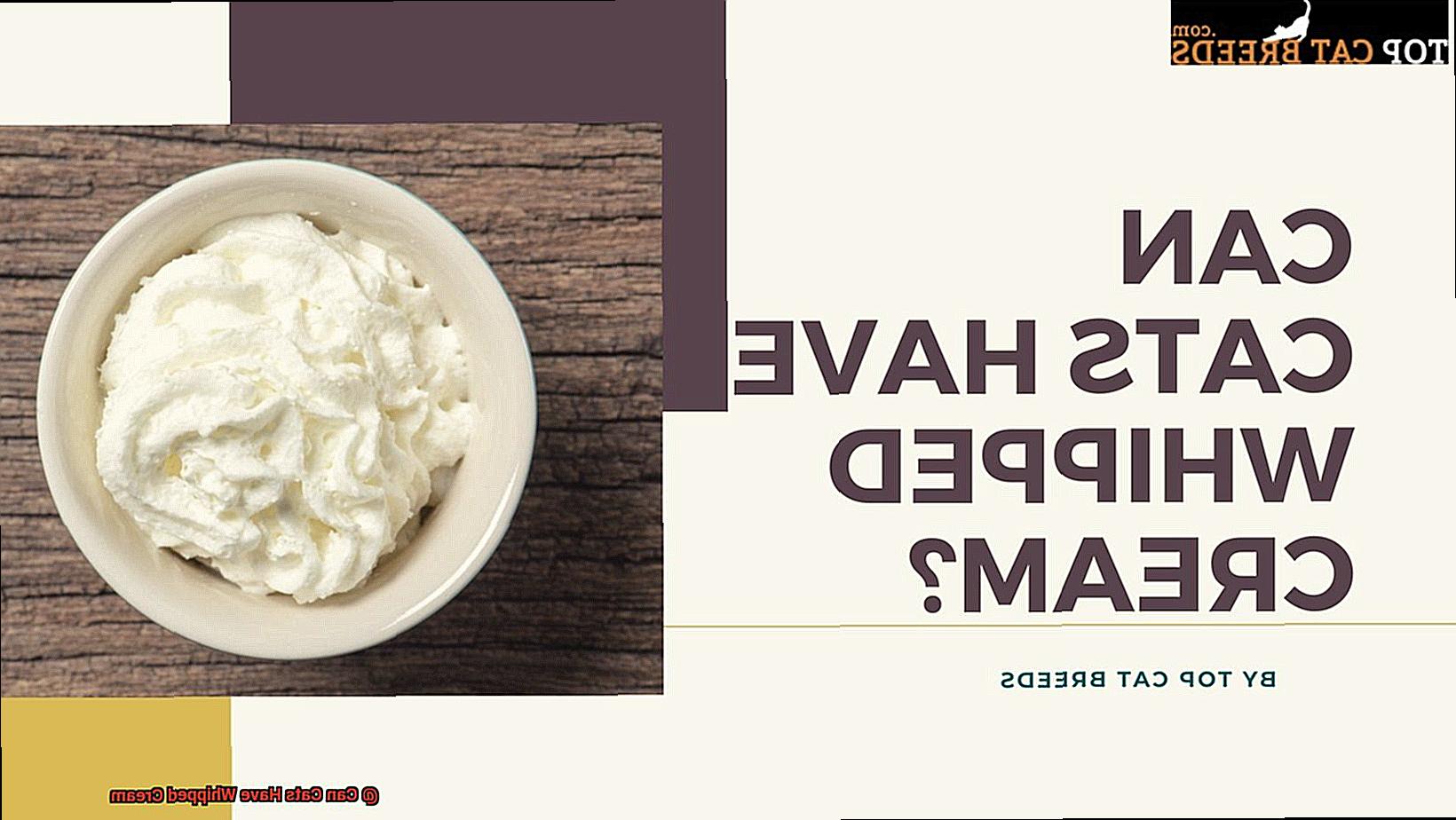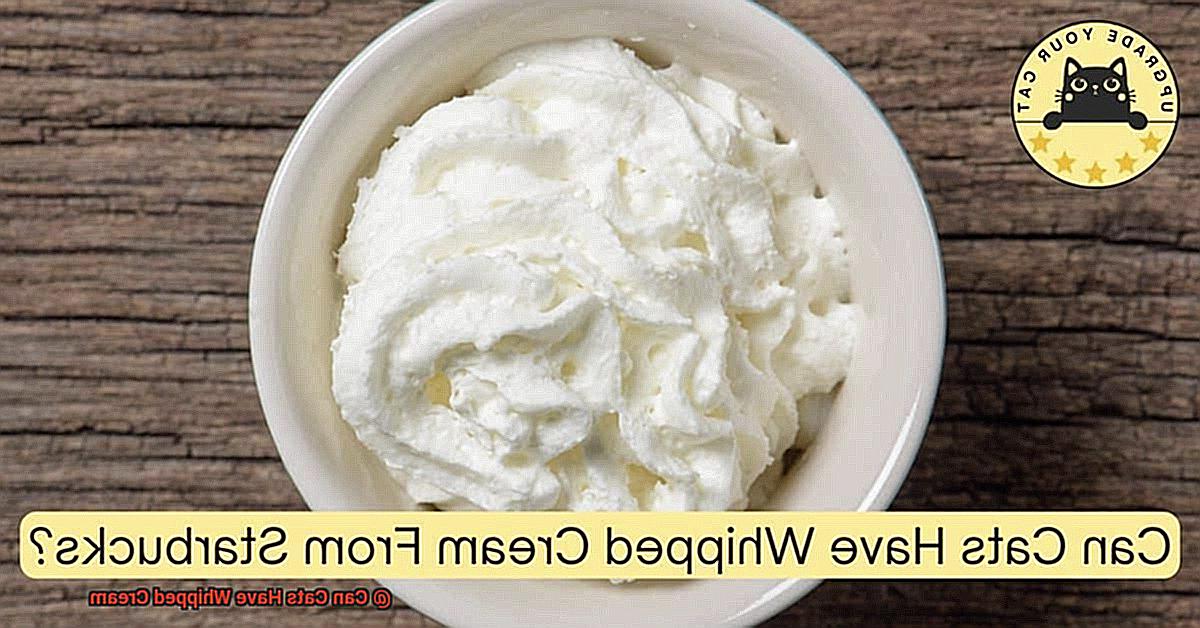Can cats have whipped cream? It’s a common question that many pet owners ask, and the answer is yes. However, it’s important to be mindful of your cat’s dietary needs before giving them a treat.
Whipped cream may seem like a harmless indulgence for your furry friend, but it’s high in fat and sugar and can be difficult for cats to digest. Plus, many contain artificial sweeteners or other ingredients that may not be safe for cats.
Fortunately, there are lots of other delicious treats you can offer your cat instead. Small pieces of cooked chicken or fish make great alternatives. You can also buy specially made cat treats that are specifically designed with their nutritional requirements in mind.
Remember, although your feline friend may love the occasional lick of whipped cream here and there, too much of this sugary treat isn’t good for them. Your cat will stay healthy and happy with the right diet and plenty of exercise.
What is Whipped Cream?

Whipped cream is a frothy and creamy topping that adds a touch of sweetness and flavor to many desserts and drinks. It is made by whipping heavy cream until it doubles in volume, and it typically contains milk fat (36-40%), sugar, and vanilla extract.
The process of making whipped cream involves incorporating air bubbles into the cream by hand or with a mechanical mixer. The final product should be light, fluffy, and soft enough to form peaks when the whisk is removed.
But can cats have whipped cream too? Unfortunately, the answer isn’t so simple. Cats are obligate carnivores, meaning their bodies require animal protein for proper nutrition.
Whipped cream does not provide any essential nutrients for cats, and because cats can be lactose intolerant, dairy products such as whipped cream can be harmful to them. While a small amount of whipped cream may not cause any real harm to a cat, it is not recommended to feed it to them often.
Fortunately, there are plenty of alternatives to whipped cream that are both safe and nutritious for felines.
Small pieces of cooked chicken or turkey, canned pumpkin, diced apples or strawberries are among the many popular choices that offer beneficial nutrition while satisfying your cat’s taste buds.
Nutritional Needs of Cats
When it comes to cats, not all treats are created equal. While it may seem like a harmless indulgence, whipped cream is not recommended for cats. Cats are obligate carnivores and require a diet rich in protein and low in carbohydrates.
Additionally, whipped cream is high in fat and sugar which can lead to digestive upset and obesity in cats.
Furthermore, cats lack the enzyme lactase which is required to break down lactose, the sugar found in milk products which can cause gastrointestinal issues such as diarrhea, vomiting, or stomach aches if consumed.
For a healthier treat option for your furry friend, try tiny pieces of cooked chicken or turkey for both nutrition and taste.
Canned pumpkin is also popular among cats as it contains fiber and other essential nutrients. Diced apples or strawberries make for delicious snack mixes that also provide essential vitamins and minerals.
Can Cats Have Whipped Cream?

When it comes to treating your cats, the question of whether they can eat whipped cream is not so straightforward. While a small amount of this tasty treat may not cause any harm, it’s important to remember that cats are obligate carnivores, and dairy products like whipped cream are not part of their natural diet.
In addition, cats can be lactose intolerant and consuming dairy products may lead to digestive issues such as diarrhea, vomiting, or an upset stomach.
So while it’s fine to offer your cat a small taste of whipped cream occasionally as a special treat, it’s best to avoid feeding them this snack on a regular basis. There are plenty of alternatives out there that will make your cat purr with delight and keep them healthy at the same time.

These include small pieces of cooked chicken or turkey, canned pumpkin, diced apples or strawberries – all with nutritional benefits for your furry friend without any of the risks associated with whipped cream.
You want to ensure that your cat is eating foods that are appropriate for their diet needs and avoid giving them treats that may cause injury.
Is Whipped Cream Bad for Cats?
The answer is a resounding yes. Whipped cream may seem like a harmless treat, but it can be highly dangerous to cats due to its high sugar and fat content, lactose intolerance, and the potential presence of other harmful ingredients.
Cats are obligate carnivores, meaning that their bodies are wired to consume animal protein. Whipped cream does not contain any nutritional value for cats and can lead to obesity and diabetes if consumed in large quantities.
Furthermore, cats are often lactose intolerant, which means they have difficulty digesting the sugar present in milk and dairy products such as whipped cream. Feeding them this type of food may cause digestive issues like diarrhea, vomiting, or an upset stomach.
Additionally, many brands of whipped cream also contain additional ingredients that can be hazardous to cats, such as flavorings and preservatives. Chocolate and artificial sweeteners are common in these products and should be avoided at all costs.
Alternatives to Whipped Cream for Cats
When it comes to treating your feline friend, you want to make sure their snacks are both delicious and nutritious. Unfortunately, whipped cream is not the right option for cats due to its high sugar and fat content, lactose, and potentially harmful ingredients. But don’t worry – there are several alternatives that will satisfy your cat’s sweet tooth without the dangers of whipped cream.
Plain yogurt is a great option for a dairy-based snack. It provides protein and contains probiotics that can promote your cat’s digestive health. However, keep in mind that cats are lactose intolerant, so they should only have a small amount of yogurt as an occasional treat.
Mashed bananas or applesauce can also be used as an alternative to whipped cream. Both of these fruits are safe for cats and contain vitamins and fiber; just ensure they are free from any added sugars or preservatives.
You can also make your own whipped cream with a small amount of heavy cream mixed with plain yogurt or pumpkin puree – making it a tasty yet safer treat for your feline companion.

Finally, try giving your cat small chunks of cooked meat such as baked chicken or turkey – but make sure not to use any seasoning or additives that may be harmful to them.
Tips on Feeding Treats to Your Cat
Feeding treats to your cat can be a great way to bond and reward good behavior. However, it is important to keep in mind that treats should not make up more than 10% of your cat’s daily calorie intake. Here are some tips to keep in mind when feeding treats to your cat:
Choose healthy treats
Look for treats that are made with high-quality ingredients and are specifically formulated for cats. Avoid treats with fillers and artificial preservatives.
Limit the amount of treats
As mentioned earlier, treats should not make up more than 10% of your cat’s daily calorie intake. It’s important to also consider how many treats your cat is already receiving throughout the day from other family members.
Avoid human food treats
Many human foods, including whipped cream, are not safe for cats. Feeding your cat human food can also lead to obesity and other health problems.
Feed treats in moderation
Feeding too many treats can lead to obesity and other health problems. Limit treats to a few times a week and monitor your cat’s weight.
Use treats as a reward
Treats are a great way to reward good behavior, such as using the litter box or scratching post.
Common Health Issues Related to Eating Whipped Cream
When it comes to treating your cat, it’s important to make sure the food is safe and healthy. While whipped cream may look like a delicious snack for cats, it is not recommended.
Cats are obligate carnivores, meaning they are designed to process animal protein rather than dairy products like whipped cream. Eating whipped cream can lead to several health issues in cats, ranging from minor to severe.
The most common issue that arises from consuming whipped cream is lactose intolerance. Most cats lack the necessary enzymes to break down lactose, a sugar found in milk and other dairy products. This can result in gastrointestinal upset, diarrhea, and vomiting in cats who eat whipped cream.
In addition to lactose intolerance, whipped cream is high in calories and has no nutritional value – feeding it regularly can cause weight gain and other health issues such as joint problems, diabetes, and heart disease. Whipped cream also contains additives such as sugar and artificial flavors which can cause allergic reactions in cats.
It’s important to remember that cats have different dietary needs than humans do – what may be tasty or safe for us may not be for them.
Conclusion
To conclude, cats can enjoy whipped cream in moderation. However, it should not replace their regular diet as it is high in fat and sugar and lacks essential cat nutrients. Additionally, cats are often lactose intolerant so eating dairy products like whipped cream may cause digestive issues such as diarrhea, vomiting or an upset stomach.
Fortunately, there are plenty of healthier alternatives you can offer your cat instead. Small pieces of cooked chicken or turkey, canned pumpkin, diced apples or strawberries all provide nutritional benefits without the risks associated with whipped cream.







